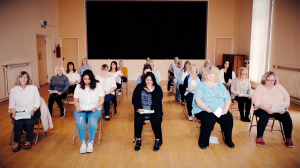
Women from across the community came together to film three plays based on their own experiences from the past 30 years. Their stories are honest and poignant, sometimes funny, and deal with difficult issues. Above all, it gives them a voice and an opportunity to explore the past, as well as looking to the future.
This peacebuilding project was funded through the Community Relations Council (CRC) Small Grants Scheme.
It involved a joint venture between Falls Women’s Centre, Shankill Women’s Centre, and Queens Park Women’s Group, with volunteer support from the Community Relations Forum.
Both Falls and Shankill Women’s Centres are core funded by CRC.
Real life voices
Film is such an important medium in helping to document people’s stories and bring real-life voices to a new audience. Another important aspect is challenging preconceptions.
Nancy Graham, Falls Women’s Centre, said: “We wanted to create something funny and lively, but there was a need to address the experience of hurt and trauma too. With the help of community dramatist Jo Egan, we began to sketch out a plan for three films.”
But releasing people’s stories into the public domain must be done responsibly, and with consideration for participants’ safety and wellbeing.
“Every line in each of the scripts was read through and discussed with the participants, in a supportive group setting,” Nancy explained. “Any line or word that caused concern was taken out, mindful of the personal risk to some in talking too freely or being perceived as criticising their own. It was a collective process – we wanted every woman to feel happy about the final cut.”
The three films are framed in the format of past, present, and future.
“The woman shared very personal, sometimes painful, stories,” Nancy explained. “But there was a lot of laughter! Which might surprise you – but the truth is, the women were glad to be out and involved again – and threw themselves so wholeheartedly into the project, it was a joy to be involved.”
Sometimes I could feel a tear come to my eye to listen to what we had all been through, the hurt, the loss, death … but, when I looked round the room at the different areas that the ladies came from, I realised that although out journey isn't over, well, at least we have started it.”
Queen’s Park Women’s Group
Dealing with difficult subject matter
“We wanted to highlight women’s contribution to peacebuilding, and create something lasting that would make our participants proud to be part of it,” Nancy said. “We felt there was a need for women to give voice to their very recent experience through lockdown – as mothers, caregivers, living alone, involved in community activism and more – recognising their own strengths and coping strategies, today as in the past.”
Reflecting on the impact of conflict on different communities
Realising that the project would be intense, the organisers invited participants who had already engaged in Good Relations projects, and had experience of reflecting on the impact of conflict on their own and the “other” community.
“Jo Egan’s experience informed the programme, which involved storytelling in single-identity groups; coming together for whole group discussion and editing of the scripts; whole group rehearsals; filming, and finally the launch,” Nancy said.
The creative decision to randomise script lines produced a puissant dimension to the finished piece.
“The decision to allocate script lines randomly had a real impact,” Nancy said. “Any of the women you see in the films could be voicing the experience of another. Isn’t that powerful?”
Honesty and lived experience
Future plans for project include the organisations involved taking the films out to other community groups as part of a good relations programme.
Nancy said: “The films are professionally made and will stand the test of time, offering many points for discussion in the context of dealing with legacy of the past and building a better future. The women’s honesty and lived experience shine out.”
Past
Present
Future